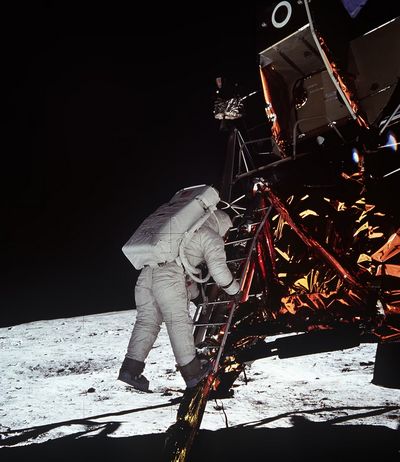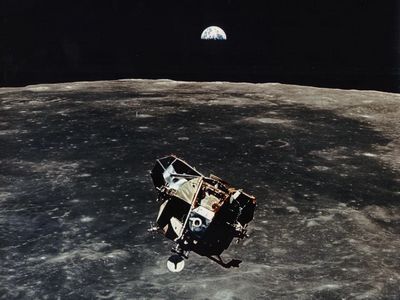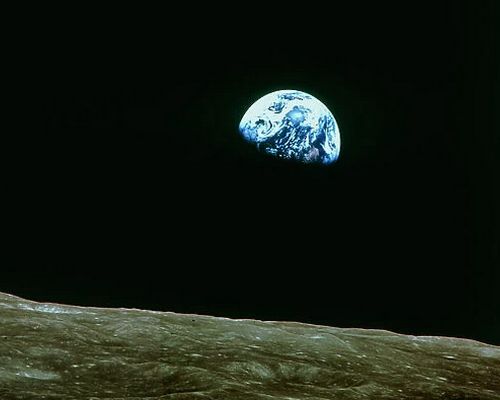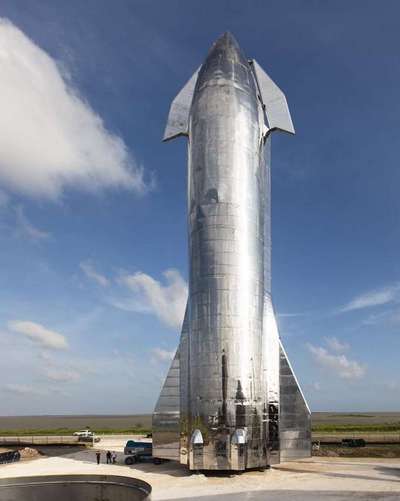
Thoughts on the 50th Anniversary
of the First Moon Landing
by Sylvia Engdahl
Half a century ago it was widely recognized that the first moon landing marked a new era, an era when, having taken the first step toward becoming a spacefaring species, we would never again be confined to one small planet. And yet, to the dismay of a good many of us, our confidence proved to have been premature. After five more moon landings in close succession we haven’t ventured beyond low Earth orbit. What went wrong?
I believe nothing went wrong—our only mistake was in our expectations. Apollo 11 was, and always will be, an unsurpassable milestone in the history of humankind. However, it set precedents that left us with false assumptions: not only an overly-optimistic idea of what would soon follow, but misconceptions about what it would take to establish an expanding human presence in space.
Apollo 11’s success was the result of a necessarily huge and expensive tax-funded project, which could not have been launched without public support. And so we assumed that future advances would always be achieved by large tax-funded projects and that public support would therefore always be needed, and could be obtained. But human progress does not ordinarily happen in that way.
If Columbus and other explorers who sought to reach new lands had needed support from the public, they could never have set sail. The settlement of those lands, though chartered and sometimes initially financed by European governments, was expected to be profitable and did not depend on the approval of the population left behind. By definition, pioneers in any field of endeavor are people with exceptional vision that is not shared by the majority of their contemporaries. It is no coincidence that we’re at last moving forward in space now that private companies are taking over, something that would not have been possible without a long period of low-orbit preparation. Nor is it surprising that in regard to ambitious plans for larger projects made by NASA, the availability of sufficient funding is questionable.
=
Apollo 11, the first human visit to another world, was a major turning point in our speces' history, but only a minority of the public understood why it was so important.
Twenty-five years ago—halfway into the hiatus that’s now ending—I taught an online Media Studies course in the Mythology of the Space Age [1]. At that time there was still strong interest in space if not in the provision of funds, and it was evident that a new mythology comparable in significance to ancient mythologies was emerging—which to me was a very hopeful sign. I focused the course on the optimistic view expressed in pop-culture space fiction, in contrast to the gloom that pervaded portrayals of future Earth. Since then, however, the darker side of Space Age mythology has become more prominent while the bright side has diminished. There are, of course, a great many people whose desire to see humans explore beyond this planet has not weakened. But a smaller percentage of the population now welcomes the thought that we are part of a vast and mysterious universe.
One form of evidence for this is the increase in pessimistic space movies, as opposed to the primarily upbeat ones of the seventies and eighties. Another is the widespread exaggeration of environmental concerns, especially the illusion that Earth can remain unchanged from generation to generation and that we can keep it that way, even to the extent of controlling its climate. And still another is the decline of public support for real space programs, which has frustrated space advocates for nearly half a century—contrary to common belief, that decline wasn’t due to boredom or apathy. Until recently I did not grasp the ambiguous nature of the mythology that was developing. I now feel that many people’s enjoyment of space fantasy was a matter of whistling in the dark.
According to one anthropological theory of mythogenesis, the one I personally favor, mythology serves the adaptive purpose of helping people confront the environment in which they perceive their culture to exist. If the perception of the extended environment changes, mythology not only changes but goes through a period of upheaval. When the first photos of Earth as a globe made clear that our world, not just in science textbooks but in reality, exists within a seemingly-endless expanse of empty space, they produced an emotional shock. In part, this was good; people became aware that Earth is beautiful and should be protected from wanton destruction. And some were elated by the possibility of venturing into new regions.

The sight of Earth from space made people realize that its beauty must be preserved, but many perceived it as the one refuge in a vast universe full of unknown terrors and unconsciously drew back from space
At first, people inwardly disturbed by what Pascal famously described as “the eternal silence of these infinite spaces” had nevertheless been drawn to space and had joined the enthusiasts in looking at it as a pleasantly exciting setting for stories; thus optimistic science fiction movies were popular while at the same time, the moon was abandoned. Until the Challenger disaster, which brought to the surface subconscious feelings that had been building up since Apollo [2], the potential terrors of the unknown were deemphasized; and the idea that if we could travel in space then visitors from elsewhere might also do so was dealt with by everyone but UFO believers through the portrayal of such aliens as friendly.
But gradually, this comforting outlook faded. Aliens are now depicted as dangerous; some scientists have begun to say that we shouldn’t attract their attention by sending SETI messages. Space activity arouses less interest than it once did, even among children, and the majority of citizens bury their heads in the sand with regard to the fact that a single planet’s resources cannot possibly support its population forever. For escapist entertainment, most now look to pure fantasy about magical realms rather than wishing “to explore strange new worlds, to seek out new life and new civilizations, to boldly go where no one has gone before.” Unconsciously if not consciously, they would prefer not to think about what lies beyond our home world.
I have come to realize that we should have never have expected it to be otherwise. For the vast majority of humankind, apprehension always has been the underlying reaction to new awareness of our place in the universe. In my essay “Confronting the Universe in the Twenty-First Century” [3] I compared our present situation to the seventeenth-century spread of knowledge that Earth was not the center of the universe and the stars were not mere lights fixed to a surrounding crystal sphere. That took people a very long time to absorb. And though our forebears did absorb it and became fascinated by the idea of inhabited worlds orbiting other suns, they did not connect that idea with everyday reality. They didn’t expect those worlds to have any impact on the inhabitants of this one, let alone imagine that someday mortals might leave it.

Entrepreneurs are leading the way forward ih space, building larger and larger spcae vehicles and undertaking more ambitious missions. That is ihow human progress always occurs.
Movement outward from this planet is not as dependent on public support as I and other space advocates once thought; entrepreneurs are beginning to take the initiative, as has happened in every other area of ongoing progress. In all probability the first ship to Mars will be launched not by the government but by Elon Musk. This is how human advance works. Of necessity, it depends on individual vision, for instinctively people sense that survival of our species (or any species) depends on new ventures being made by a few before the entire population can safely commit to them.
Thus new conceptions of reality are always embraced by a farsighted minority before being widely accepted, and the key to acceptance is not persuasion, but time. The fact that fifty years of marking time have passed since humans first set foot on the moon is cause not for pessimism, but for gladness that so much of the time is now behind us. We are on track, and in due course, when travel to the moon and Mars becomes routine, mythic expressions of our place in the universe will again serve to inspire the widespread feeling that this is how the future will be, and was always meant to be.
Notes
1. Science Fiction and Space Age Mythology Media Studies course offered in 1994 and 1995 by Connected Education, a pre-Internet online conferencing program directed by Paul Levinson, for graduate credit from the New School of Social Research.
2. See Tragedy in Space, available at this website,
and "Breaking Out from Earth's Shell," available in my book From This Green Earrh:
Essays on Looking Outward, for my belief that the public’s perception of Challenger’s
mission as exceptionally dangerous is inexplicable except as a delayed reaction
to feelings suppressed at the time of Apollo and that the disaster was merely
the trigger for expression of growing uneasiness about spacefaring.
3.
Confronting the Universe in the Twenty-First Century The Space Review,
July 23, 2012. The version in From This Green Earth: Essays on Looking Outward and
at this website includes a 2016 update about the significance of privately-funded space
ventures.
Copyright 2019 by Sylvia Engdahl
All rights reserved.
This essay is included in my book From This Green Earth: Essays on Looking Outward.